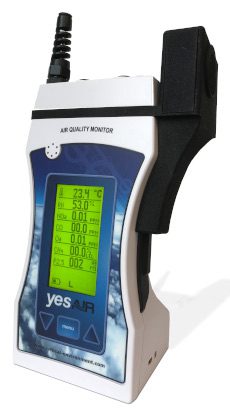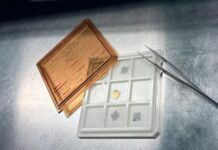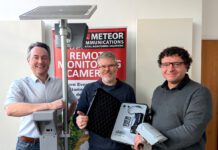
Critical Environment Technologies Canada Inc. (CETCI) was founded by Frank and Shirley Britton in 1995. Since that time, the company has expanded considerably and now employs around 35 people; developing and manufacturing gas detection equipment for global markets. One of the keys to the company’s success has been the relationship that it has built with sensor supplier Alphasense.
Frank’s career in gas detection stretches back to 1982, and when he was first visited by a sales person from Alphasense in 2003, he was immediately impressed with the representative’s technical knowledge. “It was clear that he understood the issues that manufacturers face, and had a good knowledge of the challenging applications in which our equipment is commonly deployed. This was important, because it helped to build trust.”
Following that initial meeting, it was agreed that CETCI would trial some of Alphasense’s electrochemical gas detection sensors, and Frank was pleased to see how well they performed. “It was also very encouraging to note the high level of service that we enjoyed,” he adds. “Even though there were 5,000 miles between us and 8 hours in time difference, we have always received very prompt and useful responses to our service requests.
“In fact, I would go so far as to say that Alphasense has delivered superb levels of service from day one, and as a consequence is one of our best suppliers. It is also very useful that Arthur Burnley from Alphasense visits us every year to review progress and explore new ways for us to work together in the future.”
As the relationship with Alphasense has grown the range of sensor technologies employed has expanded to include electrochemical, catalytic, optical, metal oxide and PID. For example, some of these sensors are deployed in portable indoor air quality instruments such as the YESAIR range. Available in two models (pump or diffusion) and battery powered with onboard datalogging, the YESAIR instruments have been designed for intermittent or continuous indoor air quality monitoring of temperature, RH, particulates and up to 5 gases. Each can be configured with parameter selection from more than 30 different plug and play gas sensors, as well as a particulate sensor.
CETCI also manufactures fixed gas detection systems, controllers and transmitters that are deployed to monitor hazardous gases; protecting health and safety in confined spaces and indoor environments. Customers are able to select from a range of target gases including Ammonia, Carbon monoxide, Chlorine dioxide, Chlorine, Ethylene, Ethylene oxide, Fluorine, Formaldehyde, Hydrogen, Hydrogen sulphide, Hydrogen chloride, Hydrogen cyanide, Hydrogen fluoride, Nitric oxide, Nitrogen dioxide, Oxygen, Ozone, Phosphine, Silane, Sulfur dioxide, Methane, Propane, Hydrogen, TVOCs and Refrigerants. The company’s products are employed in commercial, institutional, municipal and light industrial markets, and in a wide variety of applications. These include refrigeration plants, indoor swimming pools, water treatment plants, ice arenas, wineries and breweries, airports, hotels, fish farms, battery charging rooms, HVAC systems, food processing plants, vehicle exhausts and many more.
One of the main reasons for CETCI’s success is its ability to develop gas detectors that meet the precise requirements for specific markets. “We are large enough to employ talented people with the skills and experience to develop products that meet the latest requirements,” Frank explains. “But we are not so large that we are uninterested in niche applications – in fact we relish the challenge when a customer asks us to do something new, and this is where our relationship with Alphasense, and the technical support that they can provide, comes into its own.”
The market for gas detection equipment is constantly changing as new safety and environmental regulations are created around the world, and as new markets emerge. Again, the close relationship with Alphasense is vitally important; as new sensors are being developed, CETCI is moving into new markets that are able to utilise these technologies.
New market example: cannabis cultivation
Following the legalisation of marijuana in Canada and some other North American regions, greenhouses and other plant growth rooms have proliferated. These facilities can present a variety of potential hazards to human health. Gas powered equipment may be a source of carbon monoxide; carbon dioxide enrichment systems may be utilised; air conditioning systems can potentially leak refrigerants, and propane or natural gas furnaces may be employed for heating purposes. All of these pose a potential risk, so an appropriate detection and alarm system is necessary.
Responding to market demand, CETCI developed monitoring systems that met the requirements of the market. This included appropriate gas detectors connected to a controller with logging capability and a live display of gas levels. In the event of a leak or high gas concentration, the system can provide an audible or visual alarm, and relays can be configured to control equipment such as the ventilation system or a furnace.

Developing market example: car parking facilities
In recent years, the effects of vehicular air pollution on human health have become better understood, and received greater political and media attention. As a result, the owners and operators of parking facilities have become more aware of the ways in which they can protect their customers and staff.
Carbon monoxide is a major component of vehicle exhaust, and nitrogen dioxide levels are high in the emissions of diesel powered engines. In more modern facilities, hydrogen may accumulate as a result of electric car charging stations. CETCI has therefore developed hazardous gas detection systems to protect air quality in parking locations. This equipment includes output relays which can minimise energy costs by controlling the operation of ventilation systems.
Summarising the secrets to a long and successful partnership in gas detection, Frank says: “One of the most important issues is of course the quality of the products, and we have always been impressed with the fact that Alphasense differentiates itself from other sensor manufacturers by testing every sensor.
“The next important issue is the quality of service; we need sensors to be delivered on time and in perfect condition, and when we have a technical query we have become accustomed to a very prompt response.
“We also value highly the opportunity to develop our businesses together – through regular conversations with Arthur and his colleagues we are able to plan our future product development and marketing strategies, so that we can meet the ever changing needs of the market. This has worked extremely well for the last 17 years and we foresee it doing so for many years to come.”







